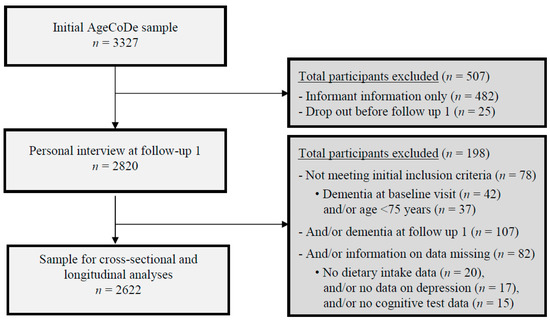Only association found was red wine being protective in men, not women. Found this by reading the book; This is Your Brain on Food by Uma Naidoo, MD, page 124.
Prospective Associations between Single Foods, Alzheimer’s Dementia and Memory Decline in the Elderly
1
Department of Geriatrics and Aging Research, University Hospital Zurich, 8091 Zurich, Switzerland
2
Centre on Aging and Mobility, University of Zurich and City Hospital Waid, 8037 Zurich, Switzerland
3
Department of Nutrition and Food Sciences, Nutritional Epidemiology, University of Bonn, 53113 Bonn, Germany
4
German Center for Neurodegenerative Diseases (DZNE), 53127 Bonn, Germany
5
Department of Neurodegenerative Diseases and Geriatric Psychiatry, University of Bonn, 53105 Bonn, Germany
6
Department of Medical Biometry, Informatics and Epidemiology, University Hospital Bonn, 53105 Bonn, Germany
7
Department of Psychiatry, Technical University of Munich, 81675 Munich, Germany
8
Department of Primary Medical Care,
Center for Psychosocial Medicine, University Medical Center
Hamburg-Eppendorf, 20246 Hamburg, Germany
9
WG Medical Statistics and IT-Infrastructure, Institute of General Practice, Hannover Medical School, 30625 Hannover, Germany
10
Department of Health Economics and Health
Services Research, Hamburg Center for Health Economics, University
Medical Center Hamburg-Eppendorf, 20246 Hamburg, Germany
*
Author to whom correspondence should be addressed.
†
These authors contributed equally.
Nutrients 2018, 10(7), 852; https://doi.org/10.3390/nu10070852
Received: 22 May 2018
/
Revised: 20 June 2018
/
Accepted: 27 June 2018
/
Published: 29 June 2018
Background:
Evidence whether single
“cognitive health” foods could prevent cognitive decline is limited. We
investigated whether dietary intake of red wine, white wine, coffee,
green tea, olive oil, fresh fish, fruits and vegetables, red meat and
sausages, assessed by a single-food-questionnaire, would be associated
with either incident Alzheimer’s dementia (AD) or verbal memory decline.
Methods:
Participants aged 75+ of the
German Study on Aging, Cognition and Dementia in Primary Care Patients
(AgeCoDe) cohort were regularly followed over 10 years (n = 2622; n
= 418 incident AD cases). Multivariable-adjusted joint modeling of
repeated-measures and survival analysis was used, taking gender and
Apolipoprotein E4 (APOE ε4) genotype into account as possible effect modifiers. Results: Only higher red wine intake was associated with a lower incidence of AD (HR = 0.92; P = 0.045). Interestingly, this was true only for men (HR = 0.82; P < 0.001), while in women higher red wine intake was associated with a higher incidence of AD (HR = 1.15; P = 0.044), and higher white wine intake with a more pronounced memory decline over time (HR = −0.13; P = 0.052).
Conclusion:
We found no evidence for these single foods to be protective against
cognitive decline, with the exception of red wine, which reduced the
risk for AD only in men. Women could be more susceptible to detrimental
effects of alcohol.(This won't go over well in my wine groups.)
View Full-Text
Keywords:
food intake; gender; apolipoprotein E ε4; memory decline; cognitive decline; dementia; Alzheimer´s dementia
▼
Show Figures
This is an open access article distributed under the Creative Commons Attribution License which permits unrestricted use, distribution, and reproduction in any medium, provided the original work is properly cited
- Supplementary File 1:
PDF-Document (PDF, 109 KiB)



No comments:
Post a Comment